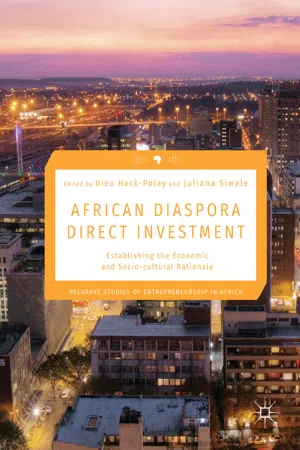The Making of the African Diaspora
The existence of the diaspora is as old as human history. Migration is therefore inherent to human existence and societies. These continuous migratory movements happen for a diversity of reasons: subsistence, augmentation of wealth , safety, etc. (Price and Benton-short 2008; Hack-Polay 2016). This has been sustained from primitive societies to Roman times till today. The diaspora is formed as some groups of migrants stay for a protracted amount of time in the host country and some do not return to the homeland .
In the case of Africa , painful events such as slavery and colonialism have sent a greater number in the diaspora than any other continent has. For example, it is argued that during slavery time C1500–1865, over 20 million Africans were taken to the Americas. The number of those displaced during the main colonial period (1860s–1960s) is not always agreed on. However, estimate figures from various sources point to somewhere around 10 million. The African migration out of Africa continued in the post-independence period. These recent migrations are largely due to poverty , unceasing wars, unemployment and further education . The United Nations (2016) estimates the number of Africans in the diaspora to be in the region of 160 million. However, this figure could be contentious because it is dependent on the meaning that one attributes to diaspora . The African Union (AU) defines the African diaspora anyone of African descent who lives in a country outside of Africa . This definition is arguable because on this premise Black Americans, Caribbeans and established Black Europeans (British, French, Dutch, Portuguese, etc.) are included in the figure. However, it can be argued that the aforementioned groups are now distinct groups, some of whom no longer associated themselves with Africa , or at least do not keep in touch with Africa and its contemporary affairs.
Reconceptualising the Diaspora
In the context of this book, we found it indispensable to revisit the definition of diaspora and consider a meaning that is more relevant and meaningful for the modern world with changing identities. We perceive the diaspora as a group of people who have left their country of origin (COO) to settle for a protracted period or indefinitely in a foreign country and have recent ties or maintain ties with the COO . In this perspective, the diaspora includes economic migrants and dependants who have been abroad for a number of years (we suggest five years and more), and refugees. This definition excludes diplomats and students as well as tourists. It will also exclude third or later generations of migrants settled in foreign countries who become citizens since these are likely to identify with the host collectivities, for example referring to themselves as Black Americans, Black British, Caribbean, etc. This perspective is supported by Crush (2011) who argues that a more realistic definition of diaspora will include those who contribute to Africa or have the potential to do so. In the case of the African diaspora , if our definition is applied, the figures will be around 25 million which, though significantly lower than the UN’s earlier stated 160 million, represents a sizeable population .
The African diaspora has grown over time. This spans through slavery times to the present. It is clear that part of this diaspora has emerged to become ‘natural’ citizens of other geographical spaces, e.g. African Americans, Black British whose fore parents were taken to the UK many centuries ago and they identify themselves as fully fledged parts of the British ethnic architecture. For the purpose of this book, we consider the African diaspora to comprise people who are recent comers to the host countries outside of Africa and maintain ties with the COO .
Such a diaspora plays a critical role in the African Renaissance. This is exemplified in Kajunju’s (2013) article which terms the diaspora ‘Africa ’s secret weapon’. Many African countries and African families look up to the diaspora for ideas and economic support . This stems from the belief that being in the diaspora signifies better lives and enhanced learning opportunities placing the migrant in a position to transfer knowledge and economic capabilities . It is estimated that over 25 million people of African descent within our diaspora definition live outside of Africa . However, the African diaspora in the broader sense accounts for over 170 million people (World Bank 2012).
Part of the literature has characterised the African diaspora as ‘brain drain ’. This signifies the loss of talent from Africa to other socio-economic and culture spheres of our globe (Network of African Science Academies (NASAC 2009)). However, more and more voices are emerging to acclaim the same migratory movements as vital to the reconstruction and development of African economies and politics (Boyo 2013; Mugimu 2010; Easterly and Nyarko 2007). This reversing trend in the perception of migration out of Africa is referred to as brain gain , to show the extent to which the diaspora could be a resource to development and peace initiatives in Africa . This trend repositions the diaspora a key player and match maker in terms of the continent moving forward (Starkab et al. 1997; Lee and Kim 2010; Batistaab et al. 2012).
Diaspora Direct Investment and Remittances
It is well established that many African migrants living abroad make significant investments in their countries of origins (COO) (Plaza and Ratha 2011). The issue of remittances is well documented. This area of investment , i.e. remittances , provides direct support for the living cost of relatives left back home, e.g. left-behind children and spouses but also the extended families comprising cousins, grandparents and parents. According to a World Ban...
